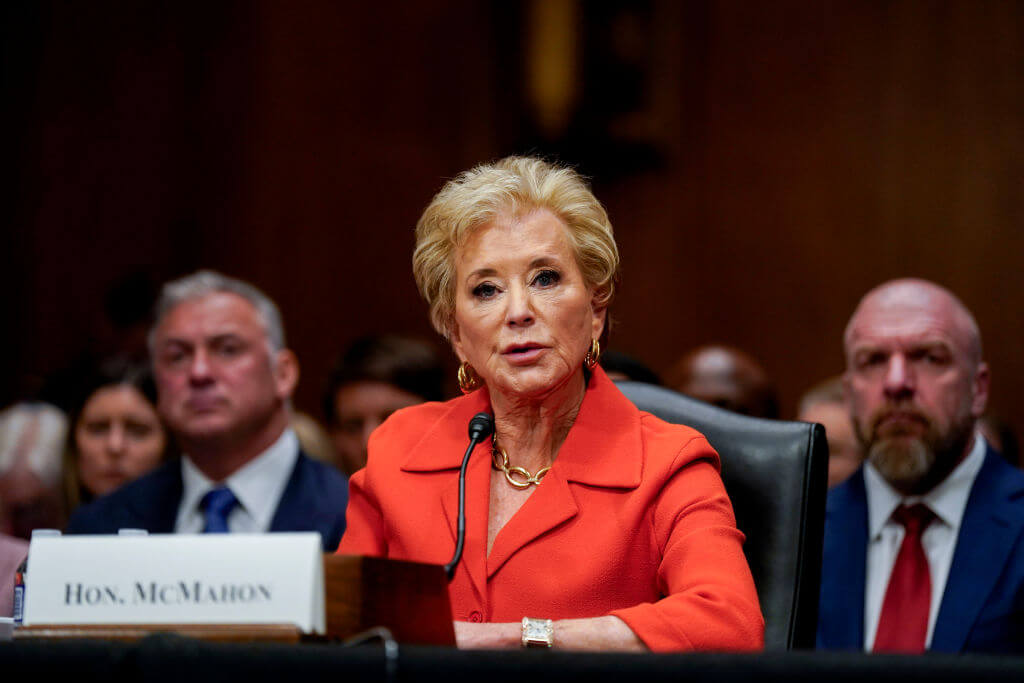What would Trump’s plan to shut down the Education Dept. mean for antisemitism investigations?
Campus antisemitism cases could move the Dept. of Justice, but federal attorneys have historically had a much higher bar for opening investigations

Linda McMahon during her confirmation hearing to lead the Department of Education, on Feb. 13. Photo by Al Drago/Bloomberg via Getty Images
President Donald Trump is reportedly preparing to sign an executive order that could shut down key functions of the Education Department and call on Congress to abolish the agency even as it serves as the main federal body investigating allegations of antisemitism.
The Education Department runs one of the largest civil rights divisions in the government, with 588 employees fielding more than 22,000 complaints in 2024, including more than 100 alleging discrimination against Jewish students as protests against Israel’s war in Gaza heated up.
The Wall Street Journal first reported the contents of the draft executive order on Monday, and The Washington Post quoted a White House official saying it could come later this month.
Meanwhile, Craig Trainor, the department’s acting assistant secretary for civil rights, announced five new investigations Monday into universities where he said “widespread antisemitic harassment has been reported.” They are Columbia, Northwestern, UC-Berkeley, the University of Minnesota and Portland State.
“Today, the department is putting universities, colleges, and K-12 schools on notice,” Trainor said in a statement. “This administration will not tolerate continued institutional indifference to the well-being of Jewish students.”
Department of Education complaints are the easiest way for students and others concerned about antisemitism to pressure school administrators to address the issue. They have led to settlements in recent months at several University of California campuses, Rutgers and Howard County Public Schools in Maryland, among other places, with the institutions generally agreeing to add training and improve reporting on civil rights complaints.
Future of antisemitism complaint system unclear
It is unclear how people would file such complaints if the Education Department were eliminated — which would require an act of Congress — or significantly scaled back its operations, as Trump’s draft executive order is expected to call for.
Project 2025, a blueprint for the Trump administration created by the Heritage Foundation, called for moving the agency’s civil rights division to the Justice Department. That department has a higher bar for opening cases; the DOE is required by law to investigate any complaint alleging a civil rights violation in the vast majority of the nation’s public and private schools.
Jewish students and staff can also bring lawsuits directly against colleges and universities, but they are costly and more complicated than filing a complaint with the Education Department, which can be done with a simple email or phone call.
Pro-Israel groups have seized on these complaints as a tool for compelling schools to limit anti-Zionist activity that they consider antisemitic. One conservative activist alone has filed dozens of complaints accusing universities of antisemitism since Oct. 7, 2023.
The complaints are filed under the Civil Rights Act of 1964, which prohibited discrimination on the basis of protected classes like race, sex and national origin.
Trump’s executive order shrinking the activities of the Education Department would follow one he signed last week that focused on fighting antisemitism. In that order, the president called on the incoming attorney general to consider intervening into some of the private lawsuits about antisemitism that have already been filed against schools like the University of Pennsylvania.
But it remains unknown whether the Trump administration would have the Justice Department or another agency take over the complaints previously handled by the Education Department either now in its newly limited state or in a future where it was eliminated.
Longstanding hostility to department
Getting rid of the department has been a campaign promise of Republican leaders almost since it was established as an independent agency by President Jimmy Carter in 1979. His successor, President Ronald Reagan, sought to cut education funding the following year.
There are at least two pieces of legislation in the House of Representatives that would dissolve the department, though it’s unclear whether either has any prospect of passing. Rep. Thomas Massie, R-Kentucky, recently introduced H.R. 899, which calls for eliminating the department; Rep. David Rouzer, R-North Carolina, introduced a more detailed bill in January that seeks to achieve the same thing.
The Senate has yet to hold a confirmation hearing for Linda McMahon, Trump’s pick for education secretary.
Trump repeatedly called for Congress to make deep cuts to the department’s budget during his first term, though lawmakers generally stopped well short of meeting those demands.
Now, according to the Wall Street Journal report, Trump’s executive order is expected to instruct his incoming education secretary to shut down all agency functions that are not required by law and to move some mandatory operations to other agencies.
The division had 588 employees last year, down from 629 in 2009; complaints nearly tripled — to 22,687 from around 6,000 — over the same period. The average caseload for an investigator has grown to 50 from 36 three years ago.
Miguel Cardona, President Joe Biden’s education secretary, called for a 26% increase — from $140 million to $177 million — in the department’s civil rights budget last year, but its funding remained flat.
Ken Marcus, who ran the agency’s office of civil rights for much of the Trump administration, said that he had pushed for more Justice Department involvement in antisemitism cases and “if done properly” shuttering the Education Department “need not reduce the effectiveness of civil rights enforcement.
















